Denture Reline
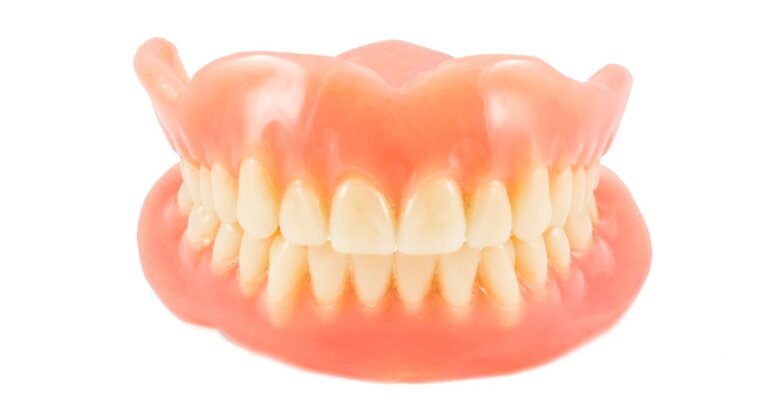
What Is A Denture Reline?
As time goes by, Dentures, the removable prosthetic teeth used to replace missing teeth, can start to lose their snug fit and comfort. This is a natural consequence of changes that occur in the oral tissues over time, such as alterations in gum shape and bone density. When dentures become loose or ill-fitting, they can lead to discomfort, difficulties in chewing, and even sore spots. This is where denture relining is helpful.
A Denture Reline is a dental procedure designed to improve the fit and comfort of dentures that have become loose or uncomfortable due to changes in the oral environment. It involves adjusting the base of the denture to better match the shape of your gums and the contours of your mouth. This procedure helps to restore the snug fit of your dentures, enhancing both comfort and functionality.
Before deciding on whether Denture Reline are right for you, there are some things you should know:
- Who Needs A Denture Reline?
- What Are The Different Types Of Denture Reline?
- What Are The Advantages Of A Denture Reline?
- What Are The Alternative Treatments If I Do Not Choose A Denture Reline?
- How Much Does A Denture Reline Cost?
- What Are The Steps In The Denture Reline Procedure?
- What Are Common Problems With A Denture Reline?
If you have any further questions about Denture Reline or other dental services offered at Atlas Dental, please contact us.

Free Phone Consultation
Have questions about an ill-fitting denture? Book a free phone consult with our Toronto dentist

5 star google reviews
Our patients love our emergency dental service! See for yourself why patients choose Atlas Dental.

Book a denture reline appointment online
We help our denture wearing patients smile confidently again.
Who Needs A Denture Reline?
While not every Denture wearer will require a reline, there are several signs and situations that indicate it might be time to consider this procedure. Here’s a closer look at who might benefit from a denture reline:
- New Denture Wearers: Even if you’re new to wearing dentures, you might find that the initial fit you experienced doesn’t last forever. Your oral tissues can adapt to dentures, causing them to become loose or uncomfortable. A denture reline early on can help ensure that your dentures fit well from the start and prevent potential issues down the road.
- Discomfort or Irritation: If you’re experiencing discomfort, sore spots, or irritation in your mouth while wearing dentures, it’s a clear indication that your dentures are not fitting properly. A denture reline can help alleviate these issues by redistributing pressure and ensuring a more even and comfortable fit.
- Changes in Speech or Chewing: Difficulty speaking clearly or chewing efficiently could be attributed to ill-fitting dentures. Clicking sounds or slipping of dentures while talking or eating are telltale signs that a reline might be needed to improve their stability and performance.
- Noticeable Changes in Fit: If you find yourself needing to use more adhesive than usual to keep your dentures in place, or if you notice they no longer sit comfortably on your gums, it’s time to consider a denture reline. These changes in fit indicate that your dentures are no longer providing the optimal support you need.
- Facial Appearance Changes: Ill-fitting dentures can sometimes lead to changes in your facial appearance, such as a sunken or collapsed appearance. A denture reline can help restore the natural contours of your face, improving both your appearance and your self-confidence.
- Dentures That Are More Than 5 Years Old: If your dentures are more than five years old, it’s a good idea to have them evaluated by a dentist. Even if you’re not experiencing obvious discomfort, changes in your oral tissues might warrant a denture reline to maintain long-term oral health and comfort.
Iif you’re a denture wearer experiencing any discomfort, changes in fit, or difficulties in speaking or chewing, a denture reline could be the solution you need. Regular dental check-ups and open communication with your dentist about your denture experience will help determine if a reline is right for you. If you have further questions about Denture Reline, please contact us.
What Are The Different Types Of Denture Reline?
Depending on your specific circumstances and the guidance of your dentist, you may opt for one of the following types of denture relines:
- Hard Denture Reline: Hard denture relines involve using a rigid, durable material to reshape the denture base. This type of reline provides a long-lasting solution and is particularly suitable for individuals with healthy oral tissues. The process involves removing a thin layer of the interior of the denture and replacing it with the new material. Hard relines offer improved fit and stability and can enhance chewing efficiency. However, it’s important to note that hard relines are less flexible than soft relines, so they may require adjustments if your oral tissues experience changes.
- Soft Denture Reline: Soft denture relines involve using a more pliable, flexible material to line the interior of the denture. This type of reline is ideal for individuals who have sensitive or tender gums, as the soft material provides added cushioning and comfort. Soft relines are less likely to cause sore spots and irritation, making them a preferred choice for those with oral health conditions or significant bone resorption. However, it’s important to be aware that soft relines may need to be replaced more frequently than hard relines due to their softer nature.
The type of denture reline that’s right for you depends on various factors, including your oral health, comfort preferences, and the guidance of your dentist. Consulting with your dental professional is essential to determine the most suitable option for your individual needs. If you have further questions about Denture Reline, please contact us.
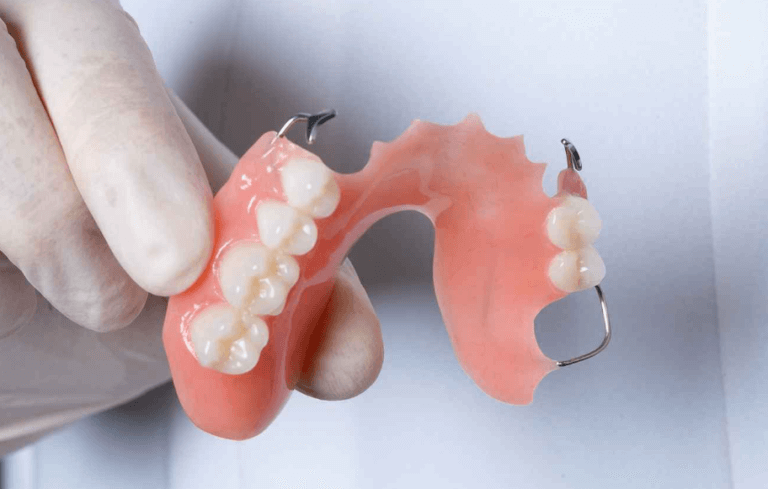
What Are The Advantages Of A Denture Reline?
Denture relining offers a range of benefits that can significantly enhance your overall denture-wearing experience. Here are some key advantages of opting for a denture reline:
- Enhanced Comfort: Ill-fitting dentures can lead to discomfort, sore spots, and even painful irritation. A denture reline ensures that your dentures fit snugly and comfortably on your gums, eliminating discomfort and enhancing your day-to-day comfort.
- Improved Stability: Loose dentures can make eating, speaking, and laughing a challenge. With a denture reline, the fit of your dentures is optimized, providing better stability and reducing the risk of embarrassing slip-ups or awkward moments.
- Better Chewing Efficiency: Dentures that fit well allow you to chew and bite more effectively, giving you the freedom to enjoy a wider variety of foods. A proper reline can help restore your chewing efficiency, allowing you to maintain a balanced and nutritious diet.
- Enhanced Speech: Poorly fitting dentures can lead to speech difficulties, such as slurred words or clicking sounds. A denture reline can help improve your speech clarity, allowing you to communicate more effectively and confidently.
- Prevention of Sore Spots: Sore spots and irritations caused by ill-fitting dentures can negatively impact your oral health. A denture reline eliminates pressure points and redistributes forces, reducing the likelihood of sore spots and oral tissue damage.
- Maintained Facial Appearance: Well-fitting dentures contribute to the natural appearance of your face by supporting facial muscles and contours. A denture reline can help ensure your dentures maintain the proper support, preventing changes in your facial profile.
- Long-Term Oral Health: Wearing loose dentures can lead to complications such as gum infections and oral sores. By addressing the fit of your dentures through a reline, you contribute to your long-term oral health and minimize the risk of oral health issues.
- Cost-Effective Solution: Denture relining is often more cost-effective than getting entirely new dentures. It allows you to extend the lifespan of your current dentures while still achieving a comfortable and functional fit.
- Increased Confidence: Knowing that your dentures fit well and won’t cause embarrassing moments can boost your confidence in social situations. You can interact with others without worrying about denture movement or discomfort.
It’s important to note that the advantages of denture reline are best realized when the procedure is performed by a qualified dental professional. Consulting with your dentist about your denture concerns and exploring the possibility of a denture reline can lead to a more comfortable and enjoyable denture-wearing experience. If you have further questions about Denture Reline, please contact us.
What Are The Alternative Treatments If I Do Not Choose A Denture Reline?
If you choose not to undergo a denture reline, there are alternative treatments and options available to address the issues caused by ill-fitting dentures. Here are some alternatives to consider:
- New Dentures: If your current dentures are significantly worn, damaged, or outdated, you might opt for getting new dentures altogether. This is a suitable option if your dentures are no longer providing the desired fit, comfort, or appearance. New dentures can be custom-made to fit your current oral contours and offer improved functionality.
- Denture Adhesives: Denture adhesives are products that help improve the retention and stability of dentures by creating a bond between the denture and the gum tissues. While denture adhesives can provide temporary relief from loose dentures, they are not a long-term solution and may not address underlying fit issues.
- Dental Implants: Dental implants are a more permanent solution for tooth replacement. If you have significant bone resorption or chronic issues with denture fit, your dentist might recommend dental implants to anchor your dentures securely in place. Implants provide stability, prevent bone loss, and enhance overall denture function.
- Implant-Supported Denture: Dental implants provide a stable foundation for dentures, enhancing stability and functionality. Implant-supported dentures are secured to implants surgically placed in your jawbone. This option offers greater chewing efficiency and can eliminate concerns about denture slippage.
- Dental Bridge: A dental bridge is a fixed prosthesis that replaces one or more missing teeth by attaching to adjacent natural teeth or implants. It’s an alternative to dentures that can provide stability and aesthetic improvement.
- No Treatment: While not recommended, choosing no treatment is an option. However, it’s essential to understand the potential consequences of not addressing ill-fitting dentures. Without functional teeth, your ability to chew, speak, and maintain oral health may be compromised. Adjacent teeth may shift, and jawbone integrity might be affected.
It’s important to have an open and honest conversation with your dentist about your concerns, preferences, and expectations. Your dental professional can provide personalized recommendations based on your oral health status, lifestyle, and goals. If you have further questions about Denture Reline, please contact us.
Cost of Denture Reline
The cost of a Denture Reline can range from $162 to $445 with or without a Dental Lab Fee depending if you require a soft or hard reline, and if it is for a complete denture or a partial denture. The codes relevant to dentures in the Ontario Dental Association’s Suggested Fee Guide appear as follows:
Denture, Reline, Direct Complete Denture (Soft Reline)
- 56211 – Maxillary: $241 – 370
- 56212 – Mandibular: $241 – 370
Denture, Reline, Direct Partial Denture (Soft Reline)
- 56221 – Maxillary: $162 – 322
- 56222 – Mandibular: $162 – 322
Denture, Reline, Processed Complete Denture (Hard Reline)
- 56231 – Maxillary: $357 + Dental Lab Fee
- 56232 – Mandibular: $445 + Dental Lab Fee
Denture, Reline Processed, Partial Denture (Hard Reline)
- 56241 – Maxillary: $357 + Dental Lab Fee
- 56242 – Mandibular: $357 + Dental Lab Fee
Denture relines are sometimes considered a supplementary service by dental insurance plans and may or may not be covered by your dental insurance. Be sure to find out from your dental insurance plan provider how much you are eligible for before going ahead with dental treatment. Your dentist can help you submit an predetermination to your dental insurance. Our fees are consistent with the ODA Fee Guide.
For patients without dental insurance, Atlas Dental is pleased to offer dental financing through Dentalcard. Affordable payment plans start at 7.95% for terms of 6 months to 6 years. To learn more about Dentalcard dental treatment financing, follow this link.
What Are The Steps In The Denture Reline Procedure?
The denture reline procedure involves several steps designed to ensure a comfortable and precise fit for your dentures. While the exact process may vary based on the type of reline you choose and your dentist’s techniques, here’s a general overview of the steps you can expect during a denture reline procedure:
- Initial Assessment: Your dentist will begin by evaluating the current fit of your dentures and assessing your oral health. They will ask you about any discomfort or issues you’ve been experiencing and discuss your expectations for the reline.
- Impressions and Measurements: For a denture reline, your dentist will take impressions of your gums and any remaining natural teeth. These impressions capture the exact contours of your mouth and serve as a basis for creating the new denture lining. Your bite will also be measured to ensure proper alignment.
- Application of Reline Material: Depending on whether you’ve chosen a hard or soft denture reline, the appropriate material will be applied to the interior of your dentures. This material conforms to the impressions taken earlier, ensuring a comfortable and precise fit.
- Placing Dentures In Your Mouth: Once the reline material is applied, your dentist will carefully place the dentures back into your mouth. They will make sure the dentures align properly with your bite and that they provide optimal stability and comfort.
- Adjustment and Trimming: Your dentist will check for any areas of discomfort or uneven pressure. If needed, they will make adjustments to ensure that your dentures sit comfortably on your gums and do not cause irritation or sore spots. Excess reline material may also be trimmed for a proper fit.
- Polishing and Finalizing: After making necessary adjustments, your dentist will polish the reline material to ensure a smooth and comfortable surface. This step helps prevent irritation and soreness caused by rough edges.
- Post-Procedure Instructions: Your dentist will provide you with care instructions for your newly relined dentures. It’s important to follow these instructions to ensure the longevity and optimal performance of your dentures.
- Follow-Up Appointments: Depending on the type of reline and your individual circumstances, your dentist might schedule a follow-up appointment to assess how well the denture reline is working for you. This gives them an opportunity to make any further adjustments if necessary.
Remember that the denture reline procedure is typically performed by a qualified dental professional who has the expertise and experience to ensure a successful outcome. By following the recommended aftercare instructions and attending any follow-up appointments, you can enjoy the benefits of a comfortable and well-fitting set of dentures. If you have further questions about Denture Reline, please contact us.
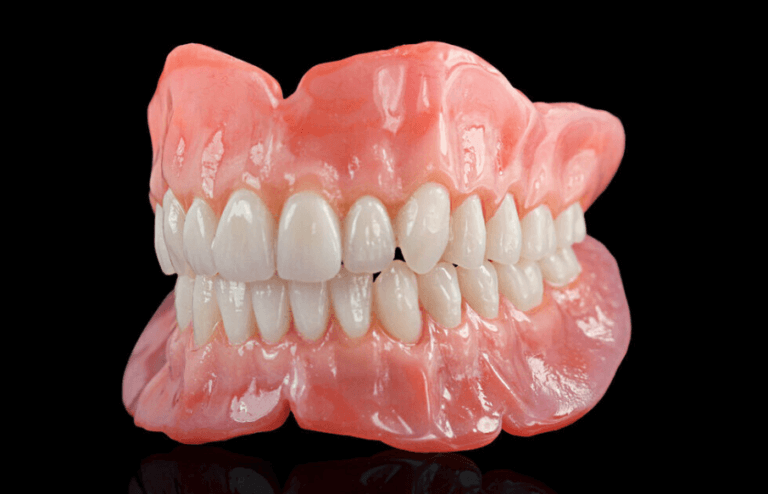
What Are Common Problems With A Denture Reline?
While denture relining is a valuable procedure that can greatly improve your denture-wearing experience, like any dental intervention, there are potential challenges that may arise. Being aware of these common problems can help you make informed decisions and address issues promptly:
- Incorrect Fit: In some cases, a denture reline may not result in the desired fit due to various factors such as inaccurate impressions or improper adjustments. An incorrect fit can lead to discomfort, sore spots, and even difficulties in eating and speaking.
- Premature Wear and Tear: Soft denture relines, while providing added cushioning, can wear down faster than hard relines. This can lead to premature degradation of the reline material, resulting in the need for more frequent replacements.
- Allergic Reactions: While rare, some individuals may experience adverse reactions to the materials used in denture relines. This can include allergies, sensitivities, or irritation of the oral tissues. If you notice any unusual reactions, it’s important to inform your dentist.
- Changes in Bite Alignment: During the reline process, changes in the bite alignment of your dentures can occur if not properly adjusted. This can lead to discomfort, difficulty in chewing, and issues with the overall function of your dentures.
- Lack of Stability: If the reline material is not applied evenly or if the dentures are not properly adjusted, you may experience a lack of stability, causing the dentures to shift or move during activities like eating or talking.
- Discomfort During Adjustment Period: After a denture reline, there might be a brief adjustment period during which your mouth adapts to the new fit. During this time, you might experience mild discomfort or soreness. However, this discomfort should subside as your mouth gets accustomed to the changes.
To mitigate these potential problems, it’s crucial to choose a qualified and experienced dental professional to perform your denture reline. Regular communication with your dentist and promptly addressing any issues you encounter can help ensure that your denture reline experience is a positive one. If you have further questions about Denture Reline, please contact us.
We also think you’ll like…
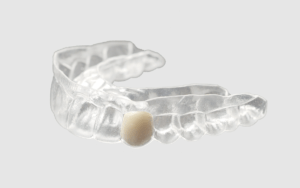
Essix Denture
Essix Denture What Is An Essix Denture? Essix Dentures are a type of removable denture crafted from transparent or translucent material, commonly known as polyethylene
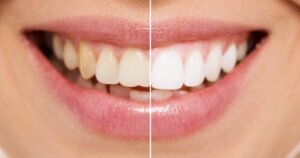
Smile Makeover
Smile Makeover What Is a Smile Makeover? A confident smile can brighten up a room and leave a lasting impression. It is a reflection of
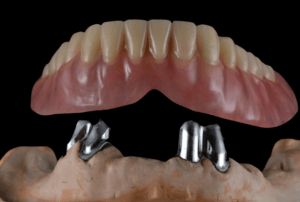
Tooth Supported Overdenture
Tooth Supported Overdenture What Is A Tooth Supported Overdenture? A Tooth Supported Overdenture is a type of removable complete denture prosthesis that rests over the
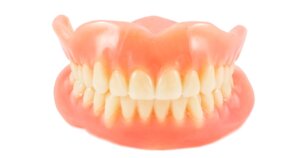
Denture Pre-Visit Instructions
Denture Pre-Visit Instructions What You Should Do Before Your Denture Appointment Cosmetic dentures can help you regain the look, feel and function of a natural
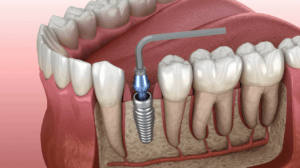
Immediate Dental Implant Placement
Immediate Dental Implant Placement What Is Immediate Dental Implant Placement? Immediate Dental Implant Placement is a revolutionary approach towards dental implants that offers numerous advantages
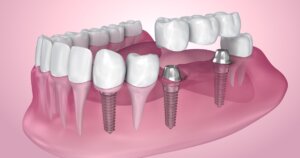
Dental Implant Bridge
Dental Implant Bridge What Is A Dental Implant Bridge? A dental implant bridge is a prosthetic device used to replace one or more missing teeth

